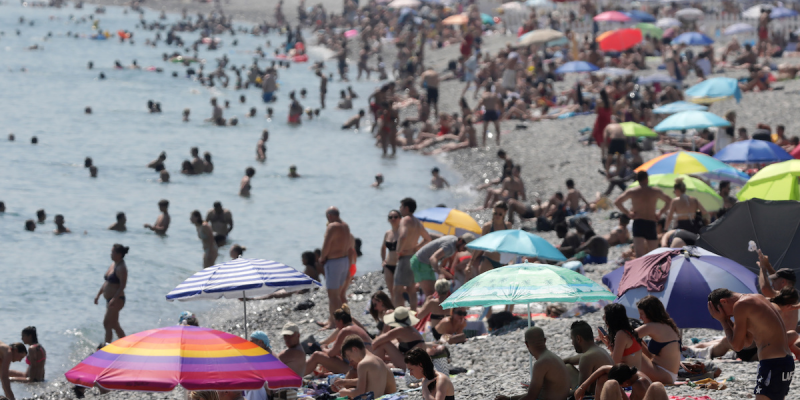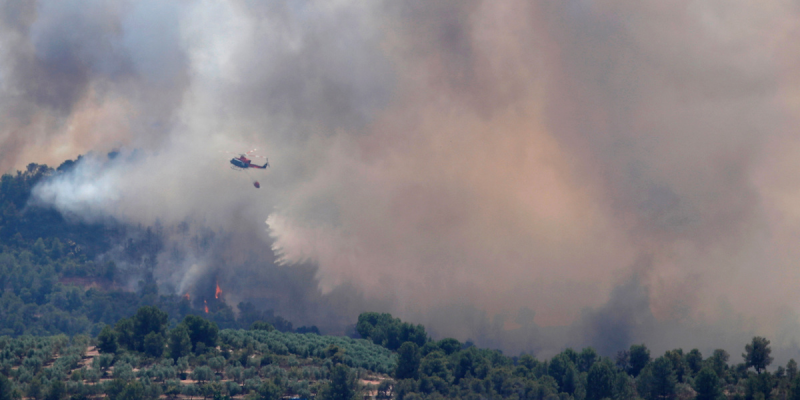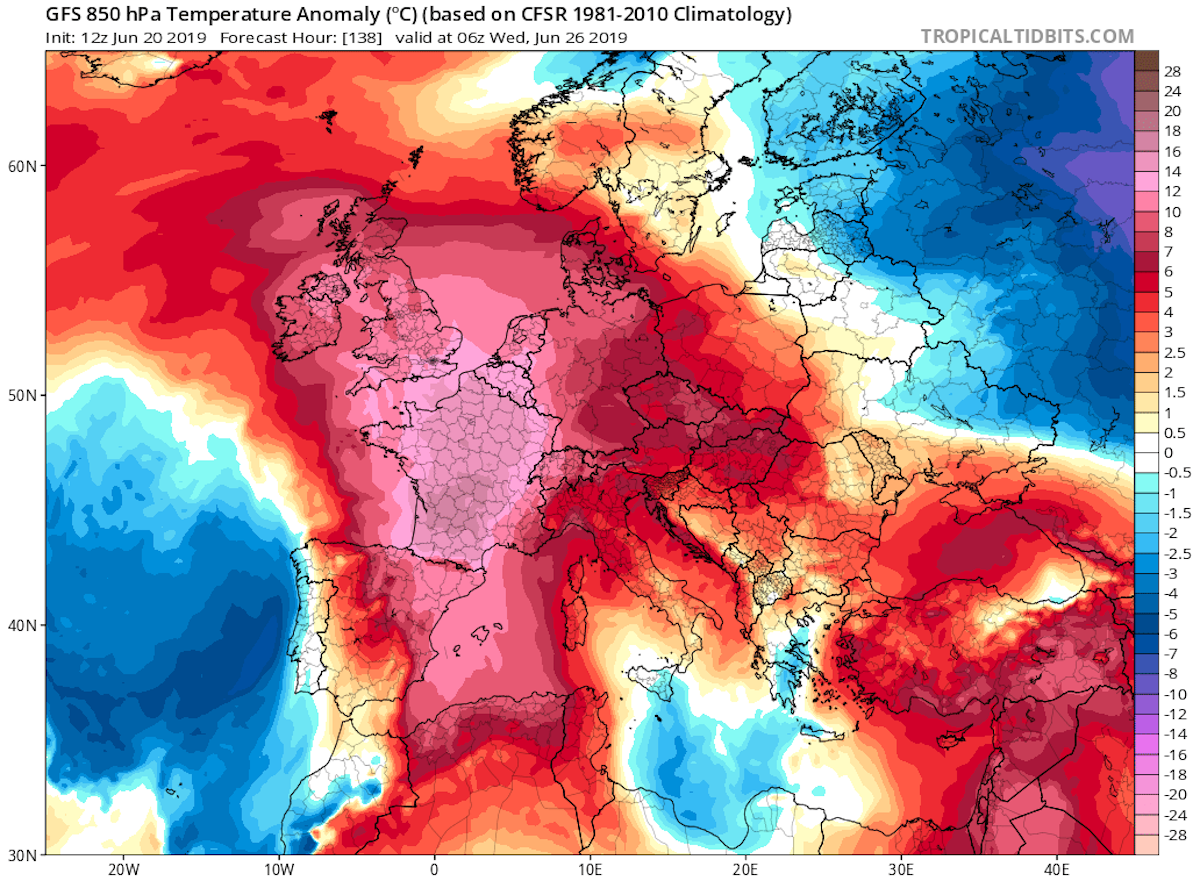- Countries including France, Germany, Spain, Switzerland, and Portugal are experiencing a massive heat wave that began on Wednesday, with hot air coming from the Sahara.
- Villevieille, a commune in southern France, was 45.1 degrees Celsius (113.18 degrees Fahrenheit) on Friday afternoon, smashing the country’s all-time temperature record. Many other national records have been broken.
- The forecast is so intense that one Spanish meteorologist tweeted: “Hell is coming.”
- Some 15,000 people in France died when temperatures hit similar heights in August 2003. At least five people have already died in France and Spain.
- Scientists attribute it to global warming and warn of more such heat waves if countries don’t cut their greenhouse-gas emissions soon.
- Visit Business Insider’s homepage for more stories.
Western Europe is in the midst of an intense, dangerous, and possibly even deadly heat wave this week.
The southern French commune of Villevieille recorded a temperature of 45.1 degrees Celsius (113.18 degrees Fahrenheit), breaking the country’s all-time record.
The heat also set new temperature records in Germany and the Czech Republic this week. Other countries like Italy, Spain, and Portugal are also grappling with temperatures much higher than normal.
It’s not clear when the heat wave will end.
Scientists have attributed the soaring temperatures to the combination of a storm over the Atlantic Ocean and high pressure over central Europe, which is importing hot air from the Sahara.
Read more: Europe's hellish heat wave is caused by a high-pressure weather system unlike any ever seen before
Advice from @EU_ENV and @eu_echo:
By 27 June, the #heatwave is expected to peak, with extreme temperatures all over the continent, with many values over 36°C and locally above 40°C. Avoid fire hazards and take care of your health health. Daily map at https://t.co/M35bZjG4SG pic.twitter.com/lrQt3yMA2q— World Meteorological Organization (@WMO) June 25, 2019
Here's what we've seen:
- The temperature in Villevielle, a small commune in southern France, was 45.1 C (113.18 F) around 3 p.m. on Friday. It broke the country's record of 44.1 C (111.4 F), which came in August 2003.
- The southeastern French city of Carpentras recorded a temperature of 44.3 C (111.74 F) around the same time.
- Météo France, the national weather agency, has put in red alerts - the highest weather warning - calling for "absolute vigilance" in some areas in southern France.
- Most of Spain is expecting temperatures in the mid-30s Celsius (mid-to late 90s F) on Thursday, with multiple northern cities forecast to hit 42 C (107.6 F) on Friday, according to government weather agency Aemet. The heat is expected to last until at least Saturday.
- Multiple Italian regions are expecting temperatures of the high-30s Celsius (late-90s F). The Italian health ministry has put seven major cities, including Florence and Rome, on the highest danger warning, the AP reported.

- Temperatures on Thursday hit 38.6 C (101.5 F) in Coschen, near the German-Polish border, setting a new German national record for June.
- Germany is forecast to heat up this weekend, with Berlin expecting a high of 39 C (102.2 F) on Sunday, the BBC reported.
- Four out of five measuring stations across the Czech Republic have seen new daily records being set this week, with the temperature in the northern town of Doksany reaching a national high of 38.5 C (101.3 F).
- Many locations in Switzerland broke their June temperature records on Wednesday, national weather agency Météo Suisse said.
- The agency has placed some northern and southern Swiss regions on the highest weather danger alert, with some areas expecting a high of 36 C (96.8 F) until Monday.
- Temperatures in Portugal are expected to hit mid-to-upper 30 degrees Celsius (upper 90s Fahrenheit) and could further rise to more than 40 C (104 F), Axios reported.
- Parts of Poland are also expected to see temperatures rise to at least 35 to 40 C (95 to 105 F) this week - which is at least 11 to 17 C (20 to 30 F) above normal, The Washington Post reported.
Silvia Laplana, a meteorologist at Spain's state-owned RTVE channel, tweeted images of the forecast temperatures in the country this week with the caption "El infierno is coming." Infierno is the Spanish word for hell.
El infierno is coming. pic.twitter.com/j0iGEYF0ge
— Silvia Laplana (@slaplana_tve) June 24, 2019
The heat wave has caused damage already
The sudden spike in temperature could be dangerous because the region is not accustomed to such high temperatures, which could put people at risk of heat-related ailments, Axios said.
Some 15,000 people across France died following a similarly aggressive heat wave in August 2003, when temperatures in the south of France hit as high as 44.1 C (111.4 F), according to France24.
Three people in southern France died of shock after plunging into cold water to escape the heat earlier this week. Two other people in Italy have died from heatstroke, The Local reported Thursday.

Massive wildfires broke out in the northeastern Catalan province of Tarragona, forcing 53 residents to evacuate and killing hundreds of sheep already, The Guardian reported.
Catalonia's interior minister, Miquel Buch, said the fire likely started when the high temperatures caused improperly stored chicken manure to combust at a farm.
The combination of high temperatures, low humidity, and high winds then caused the fire to spread, The Guardian reported. Buch tweeted that the fire was "on a scale not seen for 20 years."

Though heat waves are not uncommon in Europe, this one is unusually early. Experts say climate change is making heat waves more common.
"This increase in heat extremes is just as predicted by climate science as a consequence of global warming caused by the increasing greenhouse gases from burning coal, oil, and gas," Stefan Rahmstorf, a climatologist at the Potsdam Institute for Climate Impact Research, told the Associated Press.
Heat waves like this will continue to worsen if countries do not cut their greenhouse-gas emissions soon, a group of scientists warned in a report published earlier this month.
Read more: How extreme summer heat affects your body and brain

Recent heat waves around the world have proven to be deadly.
At least 36 people have died during a prolonged heat wave in India, which has lasted more than 30 days, according to CNN.
Temperatures in Churu, western India, rose above 50 C (122 F) on June 1, the network reported.

